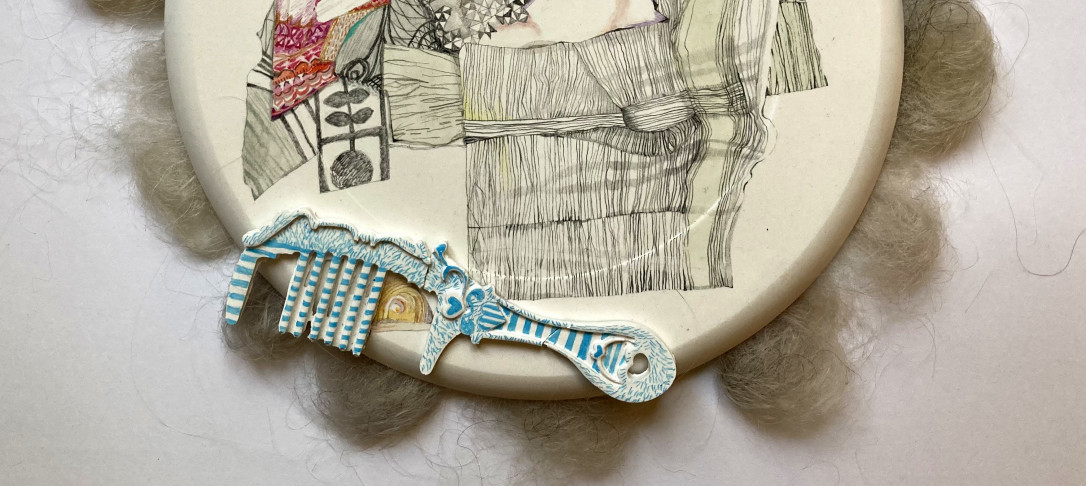
This exhibition is the first solo show by Zoë Mendelson since 2019 and is comprised of two – connected – bodies of new work.
The first is Home-body, a series of works made during the pandemic – from within sixty weeks of shielding. In this context, one type of Interior is the shell – a networked container maintained by labour and producing waste, reaching for community and receiving shopping. Another interior is the body within, navigating complex dependencies and desires. These works were all made on the edges of a kitchen table and draw on Mendelson’s, often positive, experiences of the home-as-skin.
A new body of current work, Sensorscape – in painting and installation – visualises a lived experience of micro-managing bio-data as an infographic form of memento mori. Engaging the sensor worn in her arm as a collaborator, Mendelson is producing fantastical works that consider how medical knowledge can be romanticised and potent in the moment of its gathering, yet quickly becomes waste as the body moves on from it.
Paintings onto poured plaster discs (emulating the shape/smoothness of the sensor) will ‘generate’ and sit amongst free-standing painted/drawn mountainscapes, making manifest dimensional charts and graphs of blood glucose from Mendelson’s phone. The mountainscapes, each of which presents a 24-hour period – are made onto Foresso, a product made from waste in ethical manufacturing practices.
Pattern, from the home (such as tea towels, flooring and rugs), functions like haptic data – outside the frame – and images are drawn from gathered waste. An important reference has been the Asarotos Oikos (unswept room) – Greco-Roman mosaics of fallen debris from feasts.
This work connects to moral/critical questions arising from debates around the sharing/harvesting of patient data, alongside post-humanism as a field. Artworks in this area are not often produced from a lived/cyborgian perspective and it is this consideration of the medical implant as a co- producer of art that is a focus.
In wider terms the work makes fabulous a lived experience of chronic health, engaging critical agency in ill-being as a counter to the success narrative of wellbeing that is so dominant.
Zoë Mendelson is an artist and writer with an expanded field practice. Her work incorporates animation, collage, drawing, installation, painting, performance and writing. Her interests connect art and medicine.
Mendelson makes works that consider the clinic as cultural site; histories of hygiene; wellness and the city, our relationships to waste; excessive accumulation; bio-data as lived experience and commerce as a viral metaphor.
Mendelson’s work has been shown/performed regularly nationally and internationally in public and commercial spaces since 2000. These have included Fondation Cartier, Paris (2005), Chapter, Cardiff (2006), CRAC, Alsace (2008), Barbican Centre, London (2015), Kunstmuseum Olten, Switzerland (2015), Science Museum London (2018) and Freud Museum (2022). Her writings on painting include a catalogue essay for Fully Awake (2019) and forthcoming chapter with Tom Cardwell and Geraint Evans, ’Painting as Technology’ in Teaching Painting: Painting the New (Cambridge Scholars Press).
Funded projects include a Wellcome Trust Art Award (2011) for ‘This Mess is a Place’, which focused on the psychopathology of hoarding at its intersection with rationalised collection. Mendelson has received funding for projects from the AHRC, Wellcome Trust, Arts Council England and Creative Scotland.
Mendelson’s PhD, at Central Saint Martins (2015), was titled Psychologies and Spaces of Accumulation: The hoard as collagist methodology (and other stories). This research located and spatialised systematised archiving and collecting alongside seemingly pathological object relations, and included relationships drawn between urban space and wellness. This work is currently being re-visited towards a publication.
Zoë Mendelson is Head of Painting and Printmaking at the Glasgow School of Art.
Since 2015 she has co-curated the network paintingresearch with Geraint Evans. She is also co-founder and editor of The Edit, an online and inclusive, de-canonised bibliography for students in Fine Art and related fields, now used in Arts education internationally. (www.theedit.site)
Thanks to those who made things work: Kyran Gilbert; George Hill-Baker; Tom Witherwick and to Foresso
And to Joey Ryken (without whom…)


